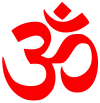براهمان

| مقالات عن |
| الهندوسية |
|---|
 |
In Hinduism, Brahman connotes the highest Universal Principle, the Ultimate Reality in the universe.[1][2][3] In major schools of Hindu philosophy, it is the material, efficient, formal and final cause of all that exists.[2][4][5] It is the pervasive, genderless, infinite, eternal truth and bliss which does not change, yet is the cause of all changes.[1][3] [6] Brahman as a metaphysical concept is the single binding unity behind diversity in all that exists in the universe.[1][7]
Brahman is a Vedic Sanskrit word, and it is conceptualized in Hinduism, states Paul Deussen, as the "creative principle which lies realized in the whole world".[8] Brahman is a key concept found in the Vedas, and it is extensively discussed in the early Upanishads.[9] The Vedas conceptualize Brahman as the Cosmic Principle.[10] In the Upanishads, it has been variously described as Sat-cit-ānanda (truth-consciousness-bliss) as well has having a form (Sakar)[11][12] and as the unchanging, permanent, highest reality.[13][14][note 1][note 2]
Brahman is discussed in Hindu texts with the concept of Atman (Self),[9][17] personal,[note 3] impersonal[note 4] or Para Brahman,[note 5] or in various combinations of these qualities depending on the philosophical school.[18] In dualistic schools of Hinduism such as the theistic Dvaita Vedanta, Brahman is different from Atman (soul) in each being.[5][19][20] In non-dual schools such as the Advaita Vedanta, Brahman is identical to the Atman, is everywhere and inside each living being, and there is connected spiritual oneness in all existence.[6][21][22]
براهمان في السيخية
براهمان في الجاينية
Scholars contest whether the concept of Brahman is rejected or accepted in Jainism. The concept of a theistic God is rejected by Jainism, but Jiva or "Atman (soul) exists" is held to be a metaphysical truth and central to its theory of rebirths and Kevala Jnana.[28]
مقارنة بين براهما و براهمان و براهمن و براهمانا
انظر أيضاً
ملاحظات
- ^ "not sublatable",[14] the final element in a dialectical process which cannot be eliminated or annihilated (German: "aufheben").
- ^ It is also defined as:
- The unchanging, infinite, immanent, and transcendent reality which is the Divine Ground of all matter, energy, time, space, being, and everything beyond in this Universe; that is the one supreme, universal spirit.[15]
- The one supreme, all pervading Spirit that is the origin and support of the phenomenal universe.[16]
- ^ Saguna Brahman, with qualities
- ^ Nirguna Brahman, without qualities
- ^ Supreme
الهامش
- ^ أ ب ت Lochtefeld, James G. (2002). The Illustrated Encyclopedia of Hinduism. Vol. 1. The Rosen Publishing Group. p. 122. ISBN 978-0823931798.
- ^ أ ب P. T. Raju (2006), Idealistic Thought of India, Routledge, ISBN 978-1406732627, page 426 and Conclusion chapter part XII
- ^ أ ب Fowler 2002, pp. 49–55 (in Upanishads), 318–319 (in Vishistadvaita), 246–248 and 252–255 (in Advaita), 342–343 (in Dvaita), 175–176 (in Samkhya-Yoga).
- ^ Mariasusai Dhavamony (2002), Hindu-Christian Dialogue: Theological Soundings and Perspectives, Rodopi Press, ISBN 978-9042015104, pages 43–44
- ^ أ ب For dualism school of Hinduism, see: Francis X. Clooney (2010), Hindu God, Christian God: How Reason Helps Break Down the Boundaries between Religions, Oxford University Press, ISBN 978-0199738724, pages 51–58, 111–115;
For monist school of Hinduism, see: B. Martinez-Bedard (2006), Types of Causes in Aristotle and Sankara, Thesis – Department of Religious Studies (Advisors: Kathryn McClymond and Sandra Dwyer), Georgia State University, pages 18–35 - ^ أ ب Brodd, Jeffrey (2009). World Religions: A Voyage of Discovery (3rd ed.). Saint Mary's Press. pp. 43–47. ISBN 978-0884899976.
- ^ Fowler 2002, pp. 50–53.
- ^ Volume 1, Motilal Banarsidass, ISBN 978-8120814684, page 91
- ^ أ ب Stephen Philips (1998), Routledge Encyclopedia of Philosophy: Brahman to Derrida (Editor; Edward Craig), Routledge, ISBN 978-0415187077, pages 1–4
- ^ Goodman, Hananya (1994). Between Jerusalem and Benares: Comparative Studies in Judaism and Hinduism. State University of New York Press. p. 121. ISBN 978-0791417164.
- ^ Raju 1992, p. 228.
- ^ Eliot Deutsch (1980), Advaita Vedanta : A Philosophical Reconstruction, University of Hawaii Press, ISBN 978-0824802714, Chapter 1
- ^ Fowler 2002, pp. 53–55.
- ^ أ ب Potter 2008, pp. 6–7.
- ^ Brodd, Jeffrey (2003). World Religions. Winona, Minnesota: Saint Mary's Press. ISBN 978-0-88489-725-5.
- ^ John Bowker (ed.)(2012), The Oxford Dictionary of World Religions, Oxford University Press.[1]
- ^ Fowler 2002, pp. 49–53.
- ^ Klaus K. Klostermaier (2007), A Survey of Hinduism, Third Edition, State University of New York Press, ISBN 978-0791470824, Chapter 12: Atman and Brahman – Self and All
- ^ Michael Myers (2000), Brahman: A Comparative Theology, Routledge, ISBN 978-0700712571, pages 124–127
- ^ Thomas Padiyath (2014), The Metaphysics of Becoming, De Gruyter, ISBN 978-3110342550, pages 155–157
- ^ Arvind Sharma (2007), Advaita Vedānta: An Introduction, Motilal Banarsidass, ISBN 978-8120820272, pages 19–40, 53–58, 79–86
- ^ John E. Welshons (2009), One Soul, One Love, One Heart, New World Library, ISBN 978-1577315889, pages 17–18
- ^ أ ب Eleanor Nesbitt (2005), Sikhism: A Very Short Introduction, Oxford University Press, ISBN 978-0192806017, Chapter 4
- ^ Jean Holm and John Bowker, Worship, Bloomsbury, ISBN, page 67
- ^ Wendy Doniger (2000), Merriam-Webster's Encyclopedia of World Religions, Merriam Webster, ISBN 978-0877790440, page 500
- ^ Rangaswami Sudhakshina (2012), Roots of Vendanta, Penguin, ISBN 978-0143064459, page 405
- ^ David Leeming (2005), The Oxford Companion to World Mythology, Oxford University Press, ISBN 978-0195156690, page 54
- ^ Ray Billington (1997), Understanding Eastern Philosophy, Routledge, ISBN 978-0415129657, page 46
ببليوگرافيا
- Fowler, Jeaneane D. (2002). Perspectives of Reality: An Introduction to the Philosophy of Hinduism. Sussex Academic Press. ISBN 978-1-898723-93-6.
{{cite book}}: Invalid|ref=harv(help) - Klostermaier, Klaus K. (2010). "Chapter 12". A Survey of Hinduism: Third Edition. State University of New York Press. ISBN 978-0-7914-8011-3.
- Michaels, Axel (2004). Hinduism. Past and present. Princeton, New Jersey: Princeton University Press.
- Potter, Karl H. (2008), The Encyclopedia of Indian Philosophies: Advaita Vedānta Up to Śaṃkara and His Pupils, Delhi: Motilal Banarsidass Publishers Private Limited
- Puligandla, Ramakrishna (1997), Fundamentals of Indian Philosophy, New Delhi: D. K. Printworld (P) Ltd.
- Raju, P. T. (1992), The Philosophical Traditions of India, Delhi: Motilal Banarsidass Publishers Private Limited
- Sinari, Ramakant (2000), Advaita and Contemporary Indian Philosophy. In: Chattopadhyana (gen.ed.), "History of Science, Philosophy and Culture in Indian Civilization. Volume II Part 2: Advaita Vedanta", Delhi: Centre for Studies in Civilizations
وصلات خارجية
- The Concept of Brahman in Hindu Philosophy, Haridas Chaudhuri (1954), Philosophy East and West, Vol. 4, No. 1, pages 47–66
- The Idea of God in Hinduism, A. S. Woodburne (1925), The Journal of Religion, Vol. 5, No. 1, pages 52–66
- The Western View of Hinduism: An Age-old Mistake (Brahman), J. M. De Mora (1997), Annals of the Bhandarkar Oriental Research Institute, Vol. 78, No. 1/4, pages 1–12
- Concepts of God Stanford Encyclopedia of Philosophy, Stanford University, (Compares Brahman with concepts of God found in other religions)
- Detailed essays on Brahman at Hinduwebsite.com




